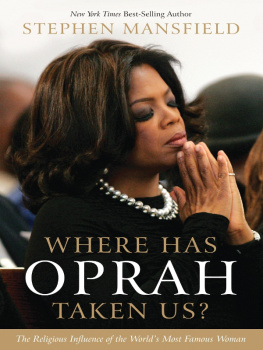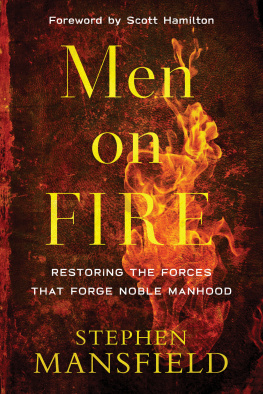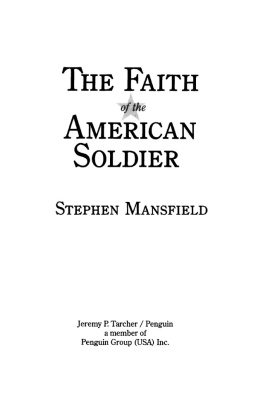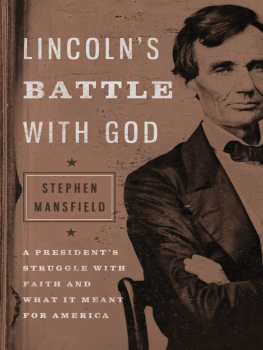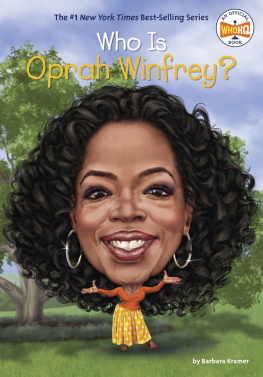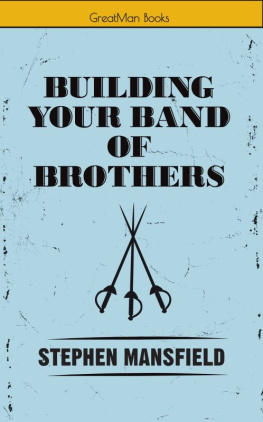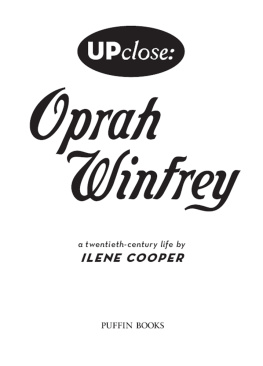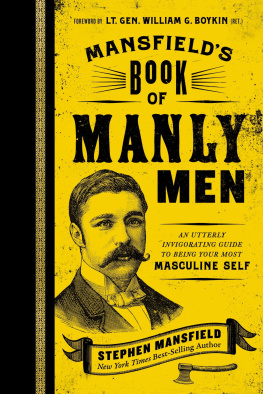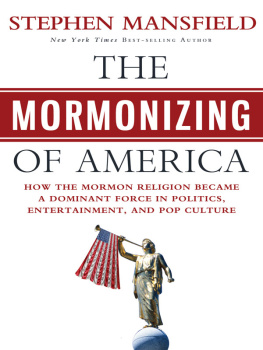
Where Has Oprah
Taken Us?
Other books by Stephen Mansfield
The Faith of Barack Obama
The Search for God and Guinness
Never Give In:
The Extraordinary Character of Winston Churchill
Then Darkness Fled:
The Liberating Wisdom of Booker T. Washington
Forgotten Founding Father:
The Heroic Legacy of George Whitefield
The Faith of George W. Bush
The Faith of the American Soldier
Benedict XVI: His Life and Mission
Where Has Oprah
Taken Us?
The Religious Influence
of the Worlds Most Famous Woman
Stephen Mansfield
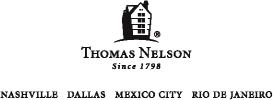
2011 by Stephen Mansfield
All rights reserved. No portion of this book may be reproduced, stored in a retrieval system, or transmitted in any form or by any meanselectronic, mechanical, photocopy, recording, scanning, or otherexcept for brief quotations in critical reviews or articles, without the prior written permission of the publisher.
Published in Nashville, Tennessee, by Thomas Nelson. Thomas Nelson is a trademark of Thomas Nelson, Inc.
Thomas Nelson, Inc., titles may be purchased in bulk for educational, business, fund-raising, or sales promotional use. For information, please e-mail SpecialMarkets@ThomasNelson.com.
ISBN 978-0-7852-3710-5 (IE)
Library of Congress Cataloging-in-Publication Data
Mansfield, Stephen.
Where has Oprah taken us? : the religious influence of the worlds most famous woman / Stephen Mansfield.
p. cm.
Includes bibliographical references.
ISBN 978-1-59555-308-9
1. Winfrey, OprahPhilosophy. 2. Winfrey, OprahReligion. 3. Television personalitiesUnited StatesBiography. 4. ActorsUnited StatesBiography. 5. Religion and cultureUnited States. I. Title.
PN1992.4.W56M35 2012
791.4502'8'092dc22
[B]
2011013385
Printed in the United States of America
11 12 13 14 15 QGF 6 5 4 3 2 1
To Annie Merle Williamson
Contents
ix
I t was September 23, 2001, and the nations wounds were fresh and bleeding. Twelve days before, Americans had endured the horrors of a vast terrorist conspiracy as it spilled out upon their shores. On that never-to-be-forgotten September 11, their proud towers had collapsed. The stronghold of their military might had been assailed. Valiant passengers aboard an airliner had wrestled hijackers and then flown their plane into the ground. Thousands had been killed. Millions more scarred forever.
Now, though, on this day, it was time to draw strength from one anotherand to heal. At New Yorks Yankee Stadium, an event announced as A Prayer for America was to be held. It was planned as an unapologetically religious affair, with the dignitaries in attendance including representatives of nearly every major faith in America. Cardinal Edward Egan, Imam Izak-El Pasha, and Dr. Inberjit Singh, a Sikh leader, were to be present, as were dozens of other clergy from nearly as many traditions. Rabbi Joseph Potasnik, the chaplain of the Fire Department of New York, would also play a role.
x
It was sure to be emotional. Opera star Plcido Domingo would sing Ave Maria. Singer Bette Midler would offer her near-classic Wind Beneath My Wings. The conclusion would come with Lee Greenwoods stirring God Bless the USA. Before that finale, survivors and grieving families of the dead would weep out their stories in testimonials that would fill the early autumn afternoon.
The hosts for the service were actor James Earl Jones and talk show host Oprah Winfrey. Jones was little surprise. Americans were used to his narrationshe was, after all, the voice of CNN and to his dignified presence at national events. One broadcaster even quipped that his grand, sonorous voice was proof of the existence of God.
It was Winfrey, though, who caused some to wonder. A slim seven years before she had been merely a television talk show host. She had risen to fame on the strength of her astonishing gifts as an interviewer, her sparkling intelligence, her unflinching boldness, and her uncanny ability to make her audiences feel she was one of them. Yet in an effort to win the war for ratings, particularly against top-rated talk show host Phil Donahue, she had begun to traffic in themes from the dark underbelly of American life. Shows with titles such as I Want My Abused Kids Back, She Asked for It: The Rape Decision, In Prison Having Teenaged Sex, Little League Pedophiles, and Married to a Molester became commonplace.
The nations moral guardians had grown outraged. Pulitzer Prizewinning television critic Tom Shales called shows like Winfreys talk rot and said that she in particular specialized in creating boob tube boobs. Consumer advocate Ralph Nader charged that Winfrey was medias worst moral polluter and wondered aloud if she and her producers must get all their ideas from the National Enquirer. When Vicki Abt, professor of sociology at Penn State, coauthored a stinging report for The Journal of Popular Culture titled The Shameless World of Phil, Sally and Oprah, sophisticates took note and began looking askance at the Chicago-based program that had become one of the most successful in television history. Popular outrage rose. Even faithful viewers grew disgusted.
xi
Winfrey and her producers felt the blows and knew a decision had to be made. It was time for a change. Before long, a new Oprah Winfrey emerged.
Both as a strategic repositioning of the program and as a product of Winfreys read on the needs of the times, the popular daytime talk show turned to religion. The eclectic, nontraditional spirituality that had long been Winfreys private source of inspiration now took center stage on her program. I am defined by the world as a talk show host, she declared, but I know that I am much more. I am spirit connected to greater spirit. This connection to greater spirit now became the celebrity guest on every episode. Religious leaders quickly replaced the victims and victimizers who had long populated her programs. Avant-garde spiritual teachers such as Marianne Williamson, John Gray, Deepak Chopra, Iyanla Vanzant, Eckhart Tolle, and Gary Zukav were eagerly featured.
Viewers were encouraged to embrace their divine selves, to live in terms of the Hindu concept of karma, and to transform their reality through visualization. They were taught to create physical healing or to overcome poverty or to fashion success by changing and focusing their thoughts. To the delight of her fans, Oprah herself began emerging from her interviewers role to extol the benefits of her unique religious life. She taught her followers the techniques of Remembering Your Spirit. She modeled the chanting of Hindu mantras. She invoked the spirits of her ancestors. On one program, she prayed for the needs of a viewer. She insisted that there is more than one path to God and enlightenment and she began to feature spokesmen for alternative faiths on her show. She spoke of a great awakening of vital spirituality wrung from the stony confines of traditional religion.
xii
So influential was Winfreys call to this novel brand of mysticism that pundits began respectfully speaking of her as Americas Pastor. The New York Times referred to her program as a secular chapel.
By the time she took the podium at the Prayer for America event in 2001, she was no longer the slime queen of daytime television. She was the champion of a bold new religious movement, one that eschewed established religious categories and created a new faith out of the personally meaningful elements of any faith.
Next page
